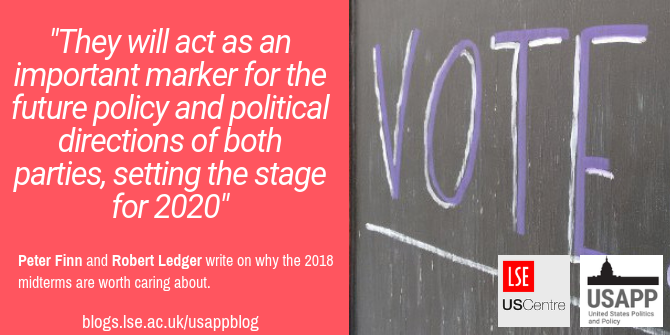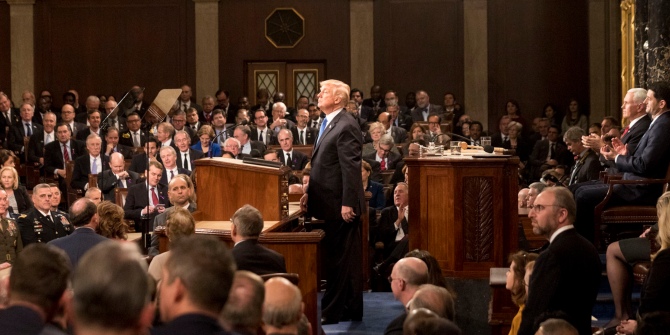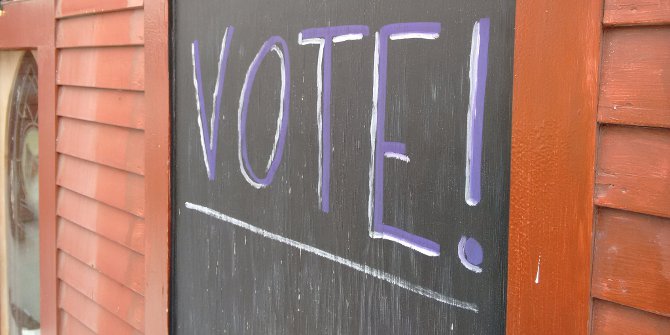
 Next week Americans will go to the polls to determine who will represent them in their state governments and in Washington DC. Peter Finn and Robert Ledger look at why the 2018 midterm elections will be consequential for President Donald Trump and the Mueller investigation into him, the future of the Democratic Party, the US economy, the polling industry, and for US foreign policy.
Next week Americans will go to the polls to determine who will represent them in their state governments and in Washington DC. Peter Finn and Robert Ledger look at why the 2018 midterm elections will be consequential for President Donald Trump and the Mueller investigation into him, the future of the Democratic Party, the US economy, the polling industry, and for US foreign policy.
- This article is part of our ‘Making Sense of the Midterms’ series curated by Rob Ledger (Schiller University) and Peter Finn (Kingston University) and published in tandem with the LSE US Centre’s public event on that theme on 7 November 2018
US Midterm elections are, despite low turnout, usually deemed crucial, a litmus test of how voters view the incumbent President and a harbinger for the next presidential election. The 2018 Midterms will be no different. The nature of Donald Trump’s 2016 victory and the tumultuous events of his time in office, however, will likely put more scrutiny than ever on the November 6th elections. The results will be used to gauge public opinion towards the administration, as well as the post-2016 direction of the Democratic Party. It seems certain the Democrats will make gains, the question is how much. Meanwhile, the President is also sure to claim vindication whatever the outcome and set this favorably against his record in office. This piece is part of the Making Sense of the Midterms series, which explores the significance of the upcoming elections from political, socio-economic and foreign policy perspectives. Among other topics, this series explores the role of economic stimulus in the election, foreign affairs, how the polls are shaping up, the likelihood of a surge in elected female representatives and the link between the midterms and the possible impeachment or resignation of Trump. With less than a week to go, it’s important to review the key themes for these elections and the impact they might have on the midterms.
The Trump record
Incumbents – even politicians who consider themselves ‘insurgents’ – are to some extent judged on their records in midterm elections. Much has been made of Donald Trump’s base and how these core supporters will probably stick with him regardless. To what extent, however, has Trump followed-through on his 2016 campaign promises? Legislatively, despite Republican control of the House and Senate, the President has little to show for almost two years in office. Healthcare reform has been stifled and the much-vaunted border wall is an unrealised – if foreboding – proposal. A tax reform package, however, was passed last December. Although primarily tax cuts for business and high earners, the short-term boost to take-home pay is, as Linda Yueh has argued in this series, likely to pay political dividends for the Republicans this November, if only to limit a possible ‘Blue Wave’.
In keeping with his reality TV-cultivated persona, that is to say of a decision-maker, Trump has signed numerous executive orders designed to satisfy his core supporters, such as the 2017 travel ban which courted so much controversy. He has also acted on his rhetoric over what he claimed were (the many) ‘worst deal(s) in history’, particularly regarding trade and foreign policy. The President has also appointed two Supreme Court judges, a key reason many conservatives supported Trump in 2016.
Where all this leaves American prestige is hotly contested. Nevertheless, there is plenty here to satisfy the Trump base. With Democrats poised to take control of the House the legislative agenda will probably grind to a halt, while other initiatives such as infrastructure spending have already stalled. The President has been frustrated by his attempts to ‘repeal and replace’ the Affordable Care Act and this now looks safe until at least 2020. Trump will presumably resort to ever more executive orders.
Democrat fightback
Trump’s presidency has energised Democratic voters, and has encouraged many others to mobilise against the President and his brand of politics. The day after Trump’s inauguration saw the several hundred thousand strong ‘Women’s March’ in Washington DC. The President’s outbursts, sympathies and conduct has shocked – in particular – many women and ethnic minorities. His response to the racist and white supremacist sentiment on show during the ‘Unite the Right’ rally in Charlottesville in August 2017, as well as the discourse surrounding the confirmation hearings of Brett Kavanaugh are just two cases in point.
As part of this series Samantha Pettey describes the momentum of Democratic women candidates in this year’s elections. Democratic activists and supporters have thus far been mobilised in a number of surprisingly close special elections, the party making gains in unlikely places such as Alabama, albeit against flawed candidates like Roy Moore. The Texas Senate race, in the shape of Democratic challenger Beto O’Rourke, is causing some excitement, although his chances seem to have declined in recent weeks. Democratic activists appear to have drawn the conclusion that the wing of the party as represented by Bernie Sanders and Elizabeth Warren offers the best chance of electoral success, though such a strategy may cause push-back from more established figures like House minority leader Nancy Pelosi. Some candidates, such as Alexandria Ocasio-Cortez, freely associate with the previously off-limits label of socialism. The Midterms will be the first test of this fledgling Democratic strategy, of a more left-wing platform relying on high voter turnout – driven by diehard opponents of Trump’s divisive politics – and will offer an insight into possible 2020 Presidential nominees.

Image credit: Peter Rukavina (Flickr, CC-NC-SA-2.0)
The economy
The Trump administration’s domestic economic policy is befitting of a short-sighted business magnate, rather than a fire-breathing populist. The President has pursued an approach long favoured by Reaganite Republicans – tax cuts for individuals and corporations. Like the Reagan administration’s policies, this approach is likely to swell the already huge US government debt. Nevertheless, old favourites like the ‘Laffer Curve’ – lower taxes will increase government revenues if correctly calibrated – and the President’s Cheney-esque (‘deficits don’t matter’) disregard of deficits and debt, have been reheated under this administration. Although a mercantilist trade policy may depress GDP growth in the medium to long term the average voter is unlikely to see any direct link, particularly as the tax cuts will provide many with a welcome dividend. In short, Trump’s economic policy is, among his base at least, poised to work in the Republicans’ favour for this election. Grumbling about its long-term effectiveness will surely be labelled as establishment thinking. An interesting development going forward would be an embrace of this type of spendthrift approach by the Democrats, under a leadership focused more on redistribution.
Polling
The 2016 presidential election was not a good one for the polling profession. Yet, as Ronald Ranta has shown in this series, Donald Trump’s victory was within the margin of error. Nevertheless, pollsters will no doubt be cautious in their predictions this year. A few outcomes appear to be taking shape leading up to Election Day. Midterms generally see gains for the opposition party, meaning it would therefore be no surprise to see the Democrats take seats from the Republicans at both the congressional and state levels: current polling suggests that the Democrats should win enough seats to take control of the House of Representatives. Some past midterm elections have been particularly noteworthy, for instance when the Republicans won majorities in 1994 and 2010, two years after Democratic Presidents (Bill Clinton in 1994, Barack Obama in 2010) took office. The odds of a ‘Blue Wave’, or Democratic landslide, however, look slim. Indeed, the Republicans appear poised to gain seats and extend their current slender majority in the Senate. It seems likely, therefore, that both parties will be able to claim a victory of sorts.
The Mueller investigation
Given the noise emanating from Trump, his supporters and their opponents, it is, perhaps, surprising that the narrative surrounding alleged collusion between the Trump Campaign and Russia during the 2016 presidential election, one of the most divisive issues currently shaping US politics, is being framed by Special Counsel Robert Mueller: who largely lets the indictments, prosecutions and plea deals emanating from his office do the talking. Indeed, since his investigation was launched in the wake of Trump’s firing of James Comey as head of the FBI in May 2017, Mueller has largely kept his own counsel, whilst simultaneously reaching plea deals with, among others, former Trump Campaign manager Paul Manafort and his former assistant Richard Gates and former Trump national security advisor Michael Flynn. Yet, whether Mueller’s investigation will tip the scales favourably for either the Democrats or the Republicans is an open question. Another possibility is that it will have a net neutral effect, with Democrats fired up by evidence Mueller has uncovered and Republicans equally so by charges they see as bogus (or at least overblown) and an investigation they perceive as illegitimate. That said, and as Allan Lichtman writes in this series, the outcomes of the midterms will affect the status of investigations into Trump and his campaign. In fact, Lichtman argues that a democratic win in the house makes an impeachment investigation, which one presumes would extensively mine evidence uncovered by Mueller, a ‘near certainty’.
US Foreign Policy
Though Trump ran on a largely isolationist platform in 2016, and the results of the midterms will likely generally reflect the domestic debates covered above, to dismiss the role of foreign affairs completely would be foolhardy. Since elected, Trump has made good on a number of his foreign affairs campaign promises, such as pulling out of the Trans Pacific Partnership trade deal, the Iran nuclear deal and the Paris Climate Accords (though if Trump loses in 2020 his, presumably democratic, successor could probably keep the US in the accords). Similarly, in recent weeks Trump has stated a desire to leave US-Russia nuclear arms control agreements and his administration has renegotiated the North American Free Trade Agreement. Although whether the US-Mexico-Canada Agreement is any more than an updating and rebranding exercise is up for debate. Together, these acts provide ample fodder for Republicans to demonstrate to their base that they have kept their promises on foreign affairs. Trump may also be able to claim similar success with relation to North Korea, though much of the detail appears to be driven by inter-Korean dialogue and initiative given space and cover by the US president rather than by Trump himself. That said, concerns about validating a regime that systematically violates the human rights of its citizens should probably be accounted for when considering this matter. Likewise, Trump’s critics will almost certainly take into account his seeming penchant for strongman leadership and regimes of absolute power if foreign policy considerations play into how they vote in the midterms. With his reticence to push Saudi Arabia over the death of Saudi journalist Jamal Khashoggi reflecting broader trends.
Why the 2018 midterm elections matter
Together, the LSE US Centre series – Making Sense of the 2018 Midterm Elections covers the upheaval of the past two years and considers how these midterms are likely to shape future events. The upcoming elections appear poised to follow a similar pattern to previous midterms, though without the far-reaching implications of years such as 1994 or 2010 (unless, perhaps, Democrats win a majority in both houses, in which case all bets are off). Nevertheless, they will act as an important marker for the future policy and political directions of both parties, setting the stage for 2020.
Please read our comments policy before commenting.
Note: This article gives the views of the author, and not the position of USApp– American Politics and Policy, nor of the London School of Economics.
Shortened URL for this post: https://bit.ly/2JptYtM
About the authors
 Peter Finn – Kingston University
Peter Finn – Kingston University
Peter Finn is a multi-award-winning lecturer in Politics and PhD candidate at Kingston University. His research is focused on conceptualising the ways that the US and the UK attempt to embed impunity for violations of international law into their national security operations. He is also interested in US politics more generally, with a particular focus on presidential power. He has, among other places, been featured in The Guardian, The Conversation, Open Democracy and Critical Studies on Terrorism.
 Robert Ledger – Schiller University
Robert Ledger – Schiller University
Robert Ledger has a PhD in political science from Queen Mary University of London. He has worked for the European Stability Initiative, a think-tank in Brussels, lectured at several universities in London and currently lives in Frankfurt am Main. He is a Visiting Researcher (Gastwissenshaftler) in the History Seminar at Goethe University and also teaches at Schiller University Heidelberg and the Frankfurt School of Finance & Management. He is the author of Neoliberal Thought and Thatcherism: ‘A Transition From Here to There?’






